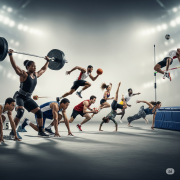An athlete is a combination of physical ability, mental capacity, and technical capabilities. It does not depend only on strength and speed. Athletes joining the Olympics are the result of training, skills, and effort that show off the distinction between human physique and intellect. Knowing the basics of athleticism is important in joining the Olympic competition, or even if you simply want to have fun playing sports.
Key Components of Athleticism
 Strength – The ability to exert force (e.g., lifting weights, jumping).
Strength – The ability to exert force (e.g., lifting weights, jumping).- Speed – How quickly you can move (e.g., sprinting).
- Agility – The ability to change direction quickly and efficiently.
- Endurance – How long you can sustain physical activity (stamina).
- Balance – Staying stable and controlled during movement.
- Coordination – Smooth, efficient movement using different body parts together.
- Power – Strength + speed (e.g., explosive movements like high jumps).
-
Strength: The Source of Power
When a sprinter steps off the blocks, a gymnast holds a perfect iron cross, or a wrestler does a clean and jerk, raw strength is a key factor in making force and staying strong. These are meant to improve both maximal and functional strength.
-
Speed: The Way to Move Fast
The rate of one’s movement, whether of a person or object, is known as the speed. Team sports like track and field, racing, and swimming essentially require this component.
-
Agility and Coordination: Movement Direction
To be coordinated is to be able to move one’s body parts with ease and efficiency. Changing directions quickly, as the balance is maintained, is a good indicator of agility. Basketball, tennis, kayaking, and gymnastics are some of the sports that require agility and body reflexes.
-
Endurance: Long Time Performance
Endurance lets players do hard physical work for long periods of time without getting tired. Physical activities on a regular basis and the smart consumption of body energy establish endurance. Long-distance races generally rely on this.
-
Balance: The Key to Take Charge
Balance is important for making precise moves, keeping from falling, and improving your posture. It makes the body more stable and easier to control while doing both motionless and moving activities.
-
Power: The Sharp Edge That Blasts
Power is the rate at which you can make force. It is the sum of your strength and speed. Athletes who have a good level of strength and speed usually alter the result of the game by making quick moves.
Last Thoughts
Athletes performing in the Olympics strive for the key components to exert their maximum potential by attending rigorous training. Regardless of your goal in sports and athletic performance, accepting to learn these aspects of athletics will help you to become more effective and productive athlete. In the end, being great comes from effort; it does not come from mere luck.
 Strength
Strength